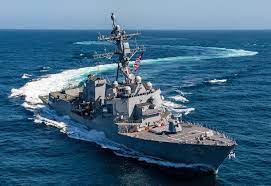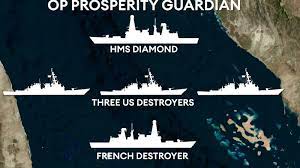
In case you missed the memo, there was a civil war in Yemen a while ago. A Zaydi Shiite movement called the Houthi began fighting Yemen’s Sunni-majority government in 2004. In 2014 the Houthis took over Yemen’s capital, Sanaa. By 2016 they solidified control over most of northern Yemen, which would not have been possible without a constant flow of money and sophisticated arms from their staunch supporter, Iran, and Iran’s puppet grotesquerie, Hezbollah. As further evidence of this support, both Iran and Hezbollah routinely deny providing it. Also, Saudi Arabia has presented such incontrovertible evidence of Iranian arms transfers that even the United States has grudgingly acknowledged Iranian involvement, even as the Biden administration hastens to provide Iran with billions’ of additional dollars to enable their shenanigans.

Sheer insanity.
True, the sheer insanity of showering billions on Tehran’s mad mullahs while Iran continues to oppose American interests (often violently) throughout the Middle East and elsewhere, might occasion a critical review from WOOF– except that the invidious anti-Americanism of Joe Biden’s foreign and domestic policies is by now so widely manifest, even liberals are taking notice, (albeit bemusedly), and our voice would merely constitute an addition to the choir.

Houthi drones, cheaper by the dozen, good for blowing up anybody in the neighborhood.

The inevitable Houthi spokesman–is he really a Red Beret?
But the Houthi rebels attracted our particular attention by going out of their way to stand out –a feat they’ve accomplished by bombarding Red Sea shipping and locations in Israel with explosive drones and rockets. The rebels’ ostensible casus belli is given as solidarity with the oppressed peoples of Gaza, on which account they seek to punish the “oppressors”–namely Israel and approximately anyone else who sails into range. That Israel is responding to one of the profoundest genocidal atrocities in recent history is dismissed on the absurd basis that Jews cannot be oppressed because they are white–a risible adaptation of Marxist dogma that was addlepate before its reduction to genetic gobbledygook, and is absolutely lunatic in its current manifestation. But only American college students and CNN anchors are truly expected to internalize such taradiddle–the Houthi are merely terrorist renegades of the common antisemitic stripe, who enjoy blowing stuff up.

No need for complicated distinctions, just check the oppressed/oppressor ratio with your university professors and you’ll know who to root for!

Lloyd Austin, thundering.
With that brand of shallow bravado typical of Biden’s hirelings, Defense Secretary Lloyd J. Austin (prior to falling somewhat-mysteriously ill and more or less disappearing for the weekend) thundered “these reckless Houthi attacks are a serious international problem… and they demand a firm international response.” Evidently, that response was supposed to mean that in addition to American Naval vessels shooting down as many Houthi drones and rockets as possible until their shipboard ordinance required resupply, our destroyers would theoretically be joined by forces from the United Kingdom, Bahrain, Canada, France, Italy, Netherlands, Norway, Seychelles and Spain. This, Austin assured us, would constitute “Operation Prosperity Guardian” a multinational mission in the Red Sea during which warships from the above-mentioned nations would theoretically assist us by shooting down as many Houthi drones and rockets as possible until their shipboard ordinance also required resupply.

Your basic drone swarms.
The obvious benefit of international assistance (besides that it sounds good to say) is budgetary, as the astronomical costs incurred by shooting at relatively cheap Houthi drones with massively expensive missiles and other highly sophisticated weaponry will theoretically be shared by the cooperating navies. The other obvious benefit is tactical. The more warships on station, the more defensive measures are deployable. This could be particularly important if the Houthi switch to “swarm attacks” employing mass numbers of drones in single assaults. Conversely, such attacks increase the chances that some drones may find a target, seriously damaging a naval ship or commercial vessel. And one obvious drawback to increasing the number of military hulls patrolling the Res Sea is that doing so simultaneously multiplies the number of available targets.

A Norwegian-flagged tanker is struck by a Houthi missile.
A stark example…
This is especially worrisome because the Houthi increasingly attack with anti-ship missiles in addition to drones, making the danger to shipping even more serious. This also presents an increased hazard to military vessels clustering in the vicinity. Readers with long memories may recall that in 1987 the USS Stark, an American Perry Class frigate patrolling the Persian Gulf, was struck by two Exocet missiles fired by an Iraqi jet. Fortunately, only the second missile exploded, but the Stark was severely damaged and 37 crew members were killed. The stricken frigate was towed to Bahrain, and subsequently to Florida, for prolonged repairs.

The USS Stark following the explosion of an Exocet missile that flew under her radar in 1987.

An Ardleigh Burke-class destroyer–probably not “the last ship.”
The Ardleigh Burke-class destroyers currently cruising the Red Sea employ shipboard defenses of a more sophisticated nature than those aboard the Stark in 1987, but the chance of a lucky hit are not inconsiderable, besides which, the ships sent by other nations are not necessarily as technologically sophisticated as our own. The sinking or severe damaging of an American, British, or affiliated warship in the Red Sea would obviously mean a tragic loss of life and materiel so grave that the Biden administration might be moved to call the offense “unacceptable” before accepting it, or perhaps, even react to it by bombing an unoccupied ammo dump or its strategic equivalent. So far, however, the Houthi have proved unable to lay a glove on the U.S. Navy. The Ardleigh Burke-class destroyer Carney alone has busied itself for weeks downing one-way drones meant to explode on contact with the Carney or other ships in the region.

USS Carney has shot down record numbers of drones and missiles, but the Houthi keep making more.
Despite such prodigious feats of sharpshooting, Houthi drone-and-rocket assaults continue to plague Red-Sea shipping. So much so that major container-ship companies are re-routing their cargo carriers around the Horn of Africa. The obvious problem with the safer route is that the detour takes more time, consumes more fuel, and leads to higher costs. Meanwhile, every indication is that drone attacks are surging over the Red Sea, even as parts of Israel continue to be targeted by rockets. In fact, Houthi aggressions even go so far as to include helicopter assaults during which at least one commercial vessel has been boarded and seized.
Appealing to the Houthis…

The Houthi diplomatic corps.
The Houthis claim to have limited boarding operations to Israeli ships only, but Israel points out that no such boardings of its vessels have occurred. On the other hand, Japan confirmed in November that Houthis had boarded an seized the Nippon Yusen-operated Galaxy Leader. Japanese spokesmen told Reuters that Japan was “appealing to the Houthis while seeking the help of Saudi, Omani, and Iranian authorities to work toward the swift release of the vessel and its crew.” Notwithstanding, the ship remains captive, and the crew hostage. The Houthis remain adamant that “All ships belonging to the Israeli enemy or that deal with it will become legitimate targets.” Be that as it may, no member of the captured crew is Israeli, and the Galaxy Leader was bound for India after departing Turkey.

Houthi “commandos” attaching the Galaxy Leader.
Prosperity marches on…

Detour!
Over one hundred container ships and other commercial vessels have opted to round the Horn of Africa rather than risk Houthi wrath in the Red Sea. Shipping lines like MSC and Hapag-Lloyd, have endured recurrent bombardments from the Houthi, declaring in late December that they would cease transiting the Red Sea entirely. Lines such as CMA CGM, and Maersk, ordered their vessels to avoid troubled waters until otherwise notified. Evergreen and OOCL announced the suspension of all cargo shipping to and from Israel until further notice. A cynic might conclude that Operation Prosperity Guardian is not prospering, nor are its protectees feeling well guarded.

Kayla Bartsch is a William F. Buckley Fellow in Political Journalism. She must be okay.
National Review, in its glory days, was rarely accused of naïveté–yet in her review of the current Red Sea debacle, NR‘s Kayla Bartsch seems to conclude unironically that “Although the U.S. has announced Operation Prosperity Guardian, it is unclear when the new security initiative will come into effect. No U.S. military response has yet taken place in the region.” In one respect, she’s not wrong. In another important respect, she’s missed the subtleties of Joe Biden’s military genius. Biden’s “security initiative” is already in effect–it just lacks initiative, and provides too little security.
Oops.

The massive allied response in the Red Sea.
When the Biden administration decided that an international response was the answer to the Red Sea problem, it grandly announced that 20 countries had rushed to support the mission. When pressed for details, however, the administration could only list 12 countries interested in participating, of which Spain and Italy were already backpedaling. It seems that President Biden lacks that hortatory flare necessary to steel the spines of our recalcitrant “allies,” especially with European electorates polling indifferently on the subject of Israel.

VDAM Cooper–the man in command.
But even if everyone cooperates, the result will be a lot more warships from a lot more countries shooting down Houthi missiles and rockets with varying degrees of success. This leaves unaltered the essential problem with Biden’s idea of a “security initiative–” namely, that it lacks any decisive clout. Currently only five warships (from France, the United Kingdom, and the United States) are participating in the operation. Vice Admiral Brad Cooper, who heads the 5th Fleet, admits that despite efforts to stymie the Houthi’s aggressions, the problem is undiminished. As the AP reports, “Yemen’s Houthi rebels show no signs of ending their reckless attacks on commercial ships.” But are the attacks really reckless? So far, they’ve cost the aggressors nothing except some bargain-rate, remote-controlled weaponry.
Shoot the archer!

Time to shoot the archer!
In a blinding moment of independent analysis and applied insight, CNN recently quoted an expert to the effect that “Given a choice and capability, it is always cheaper to take out the archers than to intercept the arrows.” Or, as Alessio Patalano, professor of war and strategy at King’s College in London, sagely observed: “There is another course of action which is striking at the source. This would shift the emphasis from intercepting the capabilities once they’re in the air to strike them at the source to prevent their use in the first place.” Remarkably, no one in the Biden administrations seems capable of figuring this out. In fact Biden has explained that reacting more strongly to Houthi provocations runs the risk of widening the war,” which the Houthi seem to be managing unassisted, to the detriment of international trade. Tim Lenderking, the U.S. special envoy for Yemen, has volunteered his hope that the “Houthis will choose the path of peace.” Obviously, Biden, Austin, Blinken and Lenderking are living in a fantasy world. They are the blowhards in this equation, except that they lack the moral conviction even to blow particularly hard.

Tim Lenderking–looking for that path to peace.
Our bases in the vicinity have endured (to date) over 120 rocket and drone attacks. Our navy vessels are warding off similar assaults on a continuing basis. Commercial ships come routinely under fire and are dealing with increased efforts at boarding them. More recently the Houthis have been using speedboats in attempts to board container ships. In a heterodox display of genuine initiative, one of our naval helicopters opened fire on a few of them and may actually have killed a few Houthis. In response, the Iranians sent a warship of their own into the contested battlespace, driving oil prices further skyward..

Iranian warship enters the Red Sea. Oil prices soar.
Call us warmongers….
We need to ignore this implicit threat and destroy the capacity of the Houthi to wage piracy on the high seas. Fighting piracy has been a duty of the United States Navy since the presidency of Thomas Jefferson, and it ought to survive the imbecilities and panderings of Joseph Robinette Biden. Call us warmongers, but no less decisive response will resolve this issue in our favor or Israel’s, or secure the safety of Dead Sea shipping.

Same Shia, different day!
The task is well within our military capability and need not even require the deployment of the United States Marines, although they remain regionally available if circumstances should demand their inclusion. Two aircraft carrier groups are within striking distance of the Houthi and could readily demolish their drone-and -missile capabilities if so ordered, but readers who deem our ruminations incendiary needn’t concern themselves much. The Biden administration remains surreally obsequious to Iran, maddeningly ambivalent toward Israel, and essentially harmless to the Houthi. Unless something fundamental changes in Washington, our warships will continue to shoot at arrows, the Houthi will continue to inflict maritime terror, and our leaders will continue to be blowhards. ![]()

Fighting piracy since 1800.




















